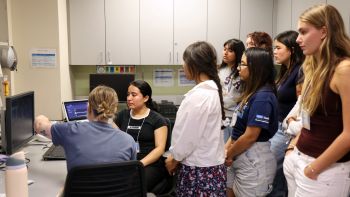The COVID-19 pandemic has been challenging for all of us. A recent survey by the CDC indicates that depression, anxiety, and serious consideration of suicide have increased since March for all age groups, but most of all for young people ages 18 to 24 (the youngest age group studied here).
To get some perspective on this, I talked to two members of the Center’s National Scientific Council: Stephen Russell, PhD, professor at the University of Texas at Austin, and Stacy Sterling, DrPH, MSW, MPH, research scientist with Kaiser Permanente.
“Young people are responsive and sensitive to what’s going on in the world,” Dr. Russell says. “And there’s so many of them for whom social relationships have radically changed, their in-person social relationships have changed. And the navigation of all of that is complicated.”
Dr. Sterling points out that many young people are living in the context of families who are also wrestling with the impacts of this crisis.
“Kids absorb so much of those stressors,” says Dr. Sterling. “So they may not be feeling physical fear for themselves, but they may be very scared for their older relatives, who are either in the line of fire from COVID, and/or experiencing job loss, potentially being evicted, and also an uptick in substance use in adults.”
There’s even more stress for already marginalized youth. LGBTQ teens might be stuck isolating with families who don’t support their identities. And generations of discriminatory policies and practices have led to disparities in wealth, housing conditions, and healthcare access that make Black and Latino youth the most likely of all children to die from this virus—a terrifying reality added to the stress of watching racial injustices play out across the US.
So the distress is not surprising, given everything that’s happening.
“There are generation defining moments, and this is clearly one,” says Dr. Russell.
How we support adolescents now can help them define themselves as the generation that made it through a dark time and emerged ready for anything.
“What’s really amazing is that people are so resilient,” says Dr. Russell. “We need to take mental health and self-harm very seriously, and we also need to realize that for any individual person, the developmental sequelae that come from that for many, many kids are going to be self-knowledge, awareness, and hopefully connection to something bigger than themselves.”
So how do we support young people who are struggling to not only get through this pandemic but to come out of it ready to thrive?
Dr. Sterling points to the foundations of adolescent well-being: adequate sleep (at least 8 hours a night for most adolescents), proper nutrition, and exercise. All of these have been made more challenging by the pandemic, when stress is running high and sports programs have been cancelled, so they have to be intentional right now.
Positive family time is good. Social media can be a life-line for important connections with friends and a way to access other supportive resources for self-compassion and mindfulness, which have been shown to support mental health in young people. Dr. Russell suggests a book like the upcoming The Self-Compassionate Teen by Karen Bluth.
For young people with medical coverage, virtual appointments with counselors and other mental health care providers appear to be an effective alternative to in-person meetings. “In fact, adolescents may even prefer it,” says Sterling.
Ultimately, how we support young people through this pandemic—and the racial justice and climate issues that are boiling over—affects all of our futures. Adolescents are still learning who they are during these years. Caring adults can help them discover their own resilience and weather this storm prepared to heal the world.
Where to Find Help
Following are resources for adolescents in emotional distress:
- Teen Line, a confidential hotline (via phone, text, or email) where teens can talk with specially trained teens about anything—anxiety, depression, self-harm, and suicide—from 6 to 10 p.m. Pacific Time every night.
- The Trevor Project offers TrevorLifeline, TrevorChat, and TrevorText for LGBTQ youth who are in crisis or just want a judgment-free place to talk with trained counselors any time of day or night.
- The National Suicide Prevention Lifeline is available 24/7 across the United States for anyone of any age thinking about suicide, worried about a loved one, or just needing emotional support.
Photo by Carrie Ramirez, 15, courtesy of First Exposures.



